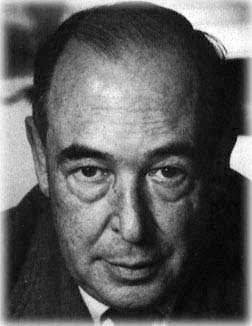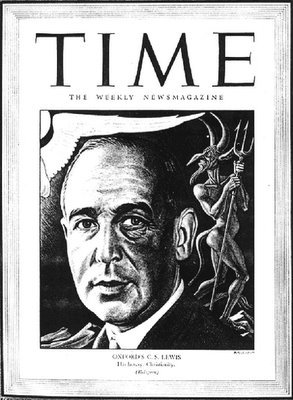
Lewis's famous Chronicles of Narnia - The Lion, The Witch and The Wardrobe, has now been adapted to film and opens nationwide this Friday, December the 9th. It is a classic; a slice of brilliant fictional allegory. But is it Christian in its claims? Many in the media have questioned the faith emphasis of the film - is it just a good moral message, or biblical Christianity in allegorical form?
Many have postulated those important questions. Two interesting quotes
(which were featured recently on
Al Mohler's blog) offer these opinions:
Andrew Hoffecker of Reformed Theological Seminary argues: "The appearance of the Narnia stories in film in December, 2005 provides an opportunity for the Reformed community to reflect on our unique constitution as thinking, imaginative beings. Lewis viewed his task as an apologist to defend Christianity in two ways: by appealing to our rational capacity and to our imagination. Christianity is something to be assented to as true. It also something to be received imaginatively. Through his allegory, The Pilgrim's Regress we witness Lewis' "apology for Christianity, Reason and Romanticism." Though the recent plethora of works on Lewis do not often refer to it, the Regress will reward those interested in how Lewis refuted modern philosophies and worldviews and perhaps spur writers to take a try at Christian allegory. The Narnia chronicles, on the other hand, receive frequent attention. Seeing them as Christian fantasy reminds those of us who are able to take up Lewis' challenge and join him by creating additional imaginative stories which may work their way into the modern consciousness and thus help convert the modern mind."Leland Ryken of Wheaton College offers these theological insights: The theological themes of The Lion, the Witch, and the Wardrobe are primarily three in number. The most important theological fact about The Lion, the Witch, and the Wardrobe is its Christological focus. The figure of Aslan dominates our experience of the book, and Aslan, as every reader of the book knows, is representative of Christ. The redemptive acts of Aslan, coupled with his coming back to life after an atoning death, retell the story of Christ's passion and resurrection. This story of salvation history is told with theological precision and with a continuous eye on the Gospel accounts of the life and death of Jesus.What say ye? Romantic religious speak or sound biblical, theological ground to stand?
The purpose of this post is to familiarize yourself with the theological pinnings behind Narnia. There will be some calm sighs of relief while walking through his beliefs; there will also be some surprising discoveries at what Lewis actually believed.
This blog is dedicated to a relentless pursuit of holding up biblical truth as the only canon for life, godliness and doctrine. It is my daily passionate burden to remind the church of what is eternal over what is expedient and to test any truth claim in the culture through the uncompromising and unchanging veracity of holy writ. Cultural trends can blur our vision as to what the Scriptures clearly teach on any subject. My only concern here is what glorifies God and meets the standard of His truth; not what
"...tickles the ears..." (cf, 2 Timothy 4:1-5).The following analysis provided by James Townsend with some circumspect editing by yours truly (I have removed two sections completely from Townsend's excelllent research: BIOGRAPHY and BOOKS). This is a long post to begin with and those two areas most people have some degree of familiarity, and if not, can be "googled" to your hearts content elsewhere.
Welcome to my Narnia: "The Doctrine, The Theology, and The Word of God"I am purposely not including my conclusions about Lewis's theology in this post.
I will offer them to you tomorrow. Until then:
Q: What do you conclude about Lewis's kind of Christianity...
orthodox or heterodox?
THE THEOLOGY OF C. S. LEWIS:
SOMEWHERE BETWEEN RANSOM AND REEPICHEEP
JAMES TOWNSEND
Bible Editor
Cook Communications, Elgin, IL
INTRODUCTIONWould you like to pretend that you haven’t just read the title above and to try your hand at a trivia quiz? Here goes. Who was the gentleman who:
-was converted to Christianity while riding to the zoo in a sidecar of his brother’s motorcycle?
-had his Christianity affirmed by Dr. Bob Jones but questioned by Dr. Martyn Lloyd-Jones(!)?
-would never have been a professor if the entrance math exam (which he failed to pass twice) hadn’t been conveniently dropped as a requirement?
-taught at colleges spelled with one letter’s difference-Magdalen and Magdalene?
-smoked at least sixty cigarettes a day-between pipes?
-lived in the same house for thirty years with a woman to whom he wasn’t married?
-had tiffs with the other leading Anglican literary critic of his time (T. S. Eliot)?
-had as his longest lifetime friend a homosexual (Arthur Greeves)?
-died the same day as President John F. Kennedy?

This composite trivia quiz does not sound like the personality profile of a candidate for the "evangelical of the year." Then again, modern conservatives probably wouldn’t have picked three murderers (or accomplices to murder), such as Moses, David, and Paul were, to have authored nineteen books of God’s inspired Word! In light of this, it’s rather amusing that C. S. Lewis-so much read by evangelicals-would probably be turned away from many of their churches if he were an aspiring pastoral candidate.
In the subtitle I placed Lewis:
"Somewhere between Ransom and Reepicheep." These two Rs are characters in Lewis’s fiction. The fictional Dr. Elwin Ransom is a Cambridge philologist (as Lewis was) whose first name has the same letters (except the substitution of an "n" for an "s") as Lewis’s last name. Ransom appears in Lewis’s space trilogy as the Christian character whose chosen role is to save the world. Another of Lewis’s fictional characters, Reepicheep, appears in his Narnia series. Reepicheep, an oversized mouse with a needle-like sword, possesses chutzpah disproportionate to his mousely size. Therefore, I raise the question: did Lewis see himself as Ransom or Reepicheep-or a bit of both? Was he the chosen apologist of the age, whose role was to save the planet (like Ransom) or was he merely a minor critter with an oversized sense of the daredevil, taking on all comers (like Reepicheep)?
Lewis’s friend, clergyman Austen Farrer, asserted: "You cannot read Lewis and tell yourself that Christianity has no important moral bearings, that it gives no coherence to the whole picture of existence, that it offers no criteria for the decision of human choices…." Lewis became a Christianized version of movie swordsman Errol Flynn with his apologetics swordplay. Like Robert Louis Stevenson’s swordsman in Kidnapped, Alan Breck Stewart, he was (to borrow Austen Farrer’s image) "a bonny fighter." Lewis’s long-term friend Owen Barfield noted that Lewis’s former student John Lawlor had reported that in Lewis’s presence he felt like he was "wielding a peashooter against a howitzer." John Beversluis called Lewis "the 20th century’s foremost defender of the faith." Lewis’s apologetics was so barbed because his learning was so encyclopedic. William Empson believed Lewis "was the best read man of his generation, one who read everything and remembered everything he read." Lewis was reputedly Oxford’s most popular lecturer for many years. By 1978 Macmillan had "published more than fourteen million copies of Lewis’ books."
Biographical sources are particularly rich for Lewis since many of his friends wrote biographies about him. Lewis’s father left a "mass of diaries, letters, and papers" and Lewis’s brother, Warnie, spent "several years typing the 3,563 pages that make up the eleven volumes of Lewis Papers…which cover the years 1850-1930." In addition, there is the "million-word diary of Warnie Lewis" and Lewis’s extensive correspondence, including close to 300 letters interchanged with lifetime friend Arthur Greeves.
THEOLOGICAL SURVEYFriends accused Lewis of a rumpled dress and a somewhat rumpled theology too. In explanation, Clyde Kilby wrote: "It is not correct to say that Lewis has a ‘theology,’ if by that term is meant a systematic, all-embracing complex like that of John Calvin or Karl Barth." Yet, as Elizabeth Elliot wrote in a 1982 interview for Discipleship Journal, Lewis claimed he was no theologian, "but he was. He covered the whole field of theology in popular, understandable language."
Not only did Lewis dress in a rumpled theology (like the rather unsystematic John Wesley), but he was somewhat like quicksilver in that he was difficult to pin down or classify. In Mere Christianity he professed to be promulgating only the beliefs which all orthodox Christians commonly hold. As a Christian supernaturalist he once observed "how much more one has in common with a real Jew or Muslim than with a wretched liberalizing, occidentalized specimen of the same category."
In two of his books he acknowledged accepting "the Nicene or Athanasian creed." Nevertheless, Lewis appeared as "an unorthodox champion of orthodoxy." Below we will survey Lewis’s treatment of the salient subjects of the traditional theological categories.
A. The BibleNaturally one who espouses Darwin’s theory of human biology forces a different view of some parts of the Bible than the traditionally accepted evangelical viewpoint. This was the case with Lewis.
On the positive side, Lewis owned: "The Scriptures come before me as a book claiming divine inspiration." Also he wrote that "all Holy Scripture [including even the imprecatory psalms] is in some sense-though not all parts of it in the same sense-the word of God."
The following statement would seem to categorize Lewis as neo-orthodox in his understanding of the Bible: "Naivete, error, contradiction, even (as in the cursing Psalms) wickedness are not removed [from the pages of the Bible]. The total result is not ‘the Word of God’ in the sense that every passage, in itself, gives impeccable science or history. It carries the Word of God…"
In his books Lewis amplified on his understanding of the Bible’s inspiration: "The earliest stratum of the Old Testament contains many truths in a form which I take to be legendary, or even mythical…things like Noah’s Ark or the sun standing still upon Ajalon," while in the New Testament "history reigns supreme." Elsewhere he wrote, "The first chapters of Genesis, no doubt, give the story in the form of a folktale…" Referring to the notion that "every sentence of the Old Testament has historical or scientific truth," Lewis admitted: "This I do not hold, any more than St. Jerome did when he said that Moses described Creation ‘after the manner of a popular poet’ (as we should say, mythically) or than Calvin did when he doubted whether the story of Job were history or fiction." Again, Lewis penned: "The Old Testament contains fabulous elements" which would include "Jonah and the Whale, Noah and his Ark,…but the Court history of King David is probably as reliable [historically] as the Court history of Louis XIV."
Lewis appraised the New Testament documents as falling in the realm of authentic history-and so at this point he was anti-Bultmannian. He opined: "As a literary historian, I am perfectly convinced that whatever else the Gospels are, they are not legends." In another context he reiterated: "I was by now too experienced in literary criticism to regard the Gospels as myths." Elsewhere Lewis stated that finding "a ‘historical Jesus’ totally different from the figure in the Synoptic tradition…I confess is a mode of ‘research’ I heartily distrust."
Not only did Lewis widen his view of inspiration to include Old Testament myths, but he also allowed for the "inspiration" of later extra-biblical material. He once wrote (in a May 7, 1959 letter) to Clyde Kilby: "If every good and perfect gift comes from the Father of lights, then all true and edifying writings, whether in Scripture or not, must be in some sense inspired." With reference to the writing of Pilgrim’s Progress, Bunyan said: "It came," and Lewis remarked: "It came. I doubt if we shall ever know more of the process called ‘inspiration’ than those two monosyllables tell us."
After researching such preceding material, Edgar Boss concluded: "Lewis does not accept the plenary verbal theory of Inspiration." Similarly, Lewis analyst Richard Cunningham deduced: "Lewis did not believe in the infallibility or the verbal inspiration of the Scriptures." Michael Christensen’s conclusion differs when he says that Lewis’s "example proved that one can be a dedicated evangelical, accept the full authority of Scripture, yet disbelieve in inerrancy." Of course, in order to buy Christensen’s conclusion one would have to present a formulated definition of what constitutes an "evangelical."
B. God and His WorkBecause Lewis adhered to the traditional orthodox view of God (though he always managed to derive fresh insights from it), we will pause only briefly on this subject. Though Out of the Silent Planet is fictional, Lewis was representing his own view when he commented: "There was one God [according to the hrossa or inhabitants of the planet Malacandra]…[who] made and still ruled the world." In arguing for monotheism as over against dualism, Lewis affirmed: "You cannot accept two conditioned and mutually independent beings as the self-grounded, self-comprehending Absolute."
Lewis subscribed not only to the unity of God but also to the Trinity. He wrote: "In God’s dimension…you find a being who is three persons while remaining one Being, just as a cube is six squares while remaining one cube."
On the subject of divine predestination, Lewis’s views come through his fiction in the mouth of Dr. Ransom who held: "Predestination and [human] freedom were apparently identical. He could no longer see any meaning in the many arguments he had heard on this subject." (Later we will see that Lewis would be classified as Arminian.)
In the matter of God’s creation, Lewis had no difficulty in being committed to theistic evolution. Lewis called man "the highest of the animals." He also acknowledged: "If by saying that man rose from brutality you mean simply that man is physically descended from animals, I have no objection." Elsewhere he said: "What difficulties I have about evolution are not religious…."
Lewis made the following distinction: "Evolutionism is something quite different from Evolution as the biologists understand it." Concerning the former, Lewis stated: "In my opinion the modern concept of Progress or Evolution (as popularly defined) is simply a myth, supported by no evidence whatever." Consequently, while he denied uniformitarian evolution as an inevitable theory of all human development, Lewis declared, "I am assuming that Darwinian biology is correct." Obviously theistic evolution is not considered kosher by many evangelicals, though such Bible scholars as A. T. Robertson, B. B. Warfield, and Augustus Strong either espoused it or did not rule it out as a live possibility.
C. ChristIn Mere Christianity Lewis referred to "Christ, the Man who was God." In The Problem of Pain he spoke of "the Incarnate God" and the Son "co-eternal with the Father." In The Weight of Glory Lewis mentioned "the humanity of Christ" and "His deity." The liberal scholar Norman Pittenger blamed Lewis "for believing that Jesus claimed deity because the fourth Gospel says He did," to which Lewis replied: "I think that Jesus Christ is (in fact) the Son of God." To Arthur Greeves (December 26, 1945) Lewis wrote that at Bethlehem "God became man."
One of the sad realities is that as a young man, Arthur Greeves had adopted the Christian view and Lewis the atheistic one. Later Greeves wandered through Unitarianism and other quagmires. Lewis replied to his letter (December 11, 1949): "Your doctrine, under its old name of Arianism, was given a…very full run for its money. But it didn’t last." Lewis asked his friend, "If [Christ] was not God, who or what was He?" He concluded: "The doctrine of Christ’s divinity seems to me not something stuck on…but something that peeps out at every point [of the New Testament] so that you have to unravel the whole web to get rid of it…and if you take away the Godhead of Christ, what is Christianity all about?" In Mere Christianity Lewis includes his belief in "the Virgin Birth of Christ."
Lewis also tackled an explanation of what is commonly called "the eternal generation of the Son." He wrote: "One of the creeds says that Christ is the Son of God ‘begotten, not created’…[which] has nothing to do with the fact that when Christ was born on the earth as a man, that man was the son of a virgin." Rather, "what God begets is God." This negative explanation clarifies somewhat but is not overly helpful. Elsewhere he penned that "the one begets and the other is begotten. The Father’s relation to the Son is not the same as the Son’s relation to the Father." Christ as "Son," Lewis observed, "cannot mean that He stands to God [the Father] in the very same physical and temporal relation which exists between offspring and male parent in the animal world;" this doctrine involves a "harmonious relation involving homogeneity." The normally ingenious and down-to-earth Lewis left his readers in the complicated and heady realms of theological disquisition on this doctrine, but (let’s face it) who has ever heard a clearly illustrated exposition of it from a pulpit? In one more attempt Lewis declared: "The Son exists because the Father exists; but there never was a time before the Father produced the Son." Lewis would probably have done better to steer clear of this subject altogether.
Two other of Lewis’s Christological opinions are interesting. In speaking of the kenosis (Philippians 2:7) he stated: "I certainly think that Christ, in the flesh, was not omniscient-if only because a human brain could not, presumably be the vehicle of omniscient consciousness…." In another comment, bearing upon John 3:13, Lewis claimed "Christ’s divine nature never left [heaven] and never returned to it." For one who never claimed to be a theologian, Lewis certainly managed to involve himself in some intricate theological twine. Nevertheless, he was emphatic about retaining the full deity and humanity of Christ as addressed in the early Christian creeds.
Lewis exquisitely represented Christ in His death and resurrection under the image of the lion Aslan in the Narnia series. There Aslan is villainously killed, but comes back to life again. It is a lovely metaphor in fantasy form.
D. Humanity and SinOn the matter of human will, Lewis wrote: "God willed the free will of men and angels in spite of His knowledge that it could lead in some cases to sin and thence to suffering: i.e., He thought freedom worth creating even at that price." In his radio broadcast Lewis indicated that God "gave [humans] free will. He gave them free will because a world of mere automata could never love…"
Lewis once argued: "The infinite value of each human soul is not a Christian doctrine. God did not die for man because of some value perceived in him. He loved us not because we are lovable, but because He is love."
On the subject of human sin, Green and Hooper comment that "many find it difficult to accept Lewis’s belief in a literal…fall of man and his fundamentalist doctrine of original sin…." While Lewis did hold to a serious doctrine of sin, one wonders if the preceding two authors have overstated their case by attaching the qualifiers "literal" and "fundamentalist" to their assessment, since Lewis did regard Genesis 3 mythically. He wrote: "The Fall consisted in Disobedience"…while the Fall consisted in Disobedience, it resulted, like Satan’s [fall], from Pride…." As Dr. Ransom, the Christian in Perelandra, pictorially put it: "We are all a bent race." On a broader canvas Lewis brush-stroked: "A sound theory of value demands…that good should be the tree and evil the ivy. Evil has…its parasitic existence."
Concerning the doctrine of "total depravity," Lewis wrote: "I disbelieve that doctrine." Yet he may have misunderstood the nature of the doctrine due to its nomenclature, for in the same section he wrote that "we all sin" and are "in some respects a horror to God" and "vile." Indeed, in his radio broadcasts he told thousands of listeners: "The first step [for us] is to create, or recover, a sense of guilt."
E. Angels, the Devil, and DemonsLewis was quite traditional here as he stated: "No reference to the Devil or devils [demons] is included in any Christian Creeds, and it is possible to be a Christian without believing in them. [However,] I do believe such beings exist…" Elsewhere Lewis reported:
I do…believe in devils [or demons]. That is to say, I believe in angels and I believe that some of them, by abuse of their free will, have become enemies to God and, as a corollary, to us. These we may call devils. They do not differ in nature [I think the term "constitution" might be better than "nature"] from good angels, but their nature is depraved. Satan, the leader or dictator of devils, is the opposite not of God but of Michael.
In other words, Satan is inferior to God; there is no true dualism.
F. Salvation1. Substitutionary AtonementSince JOTGES was conceived in response to a concern over soteriology, we will spend considerable space here. In commenting upon his friend Charles Williams’s poem, Lewis offered this commentary: "The Atonement was a Substitution, just as Anselm said: ‘All salvation, everywhere and at all time,…is vicarious.’" This, however, appears to be Williams’s view rather than Lewis’s.
In The Allegory of Love Lewis referred to a poem whose "theology turns on a crudely substitutional view of the Atonement." In Mere Christianity Lewis indicated that he did not accept the substitutionary view of atonement.
Arthur Greeves’s cousin, Sir Lucius O’Brien, claimed that the atonement was not taught in the Gospels. Lewis countered that the atonement must have been an integral part of Christ’s teaching because "the Apostles…did teach this doctrine in His name immediately after His death."
Unless Lewis altered his opinion in later years, it would appear that he saw some difference between vicarious and substitutionary atonement, for he wrote: "In the Incarnation we get…this idea of vicariousness of one person profiting by the earning of another person. In its highest form that is the very center of Christianity."Lewis’s apparent devaluing of substitution led Edgar Boss to conclude that Lewis held "the Example Theory [of the Atonement] with a very important modification. Mr. Lewis is a supernaturalist, while the Example Theory is usually held by Naturalists." However, I do not think Lewis would have wished to be so neatly pigeonholed into that single category. For him this was the bottom line: "Christ’s death redeemed man from sin, but I can make nothing of the theories as to how!"
2. Justification by FaithTwo analysts of very different stripes articulated one major weakness in the expression of Lewis’s soteriology. A. N. Wilson asserted: "If the mark of a reborn evangelical is a devotion to the Epistles of Paul and, in particular, to the doctrine of Justification by Faith, then there can have been few Christian converts less evangelical than Lewis." In fact, the Methodist minister who reviewed Mere Christianity claimed that the book "does not really mention…the central Christian doctrine of Justification by Faith." From the other end of the theological spectrum, J. I. Packer spoke of Lewis’s "failure ever to mention justification by faith when speaking of the forgiveness of sins, and his apparent hospitality to baptismal regeneration…."
3. Salvation by GraceReaders of this journal will nonetheless rejoice in Lewis’s emphasis on the doctrine of grace. In Reflections on the Psalms he summarized: "We are all in the same boat. We must all pin our hopes on the mercy of God and the work of Christ, not on our own goodness." In another context Lewis declared: "We are saved by grace…In our flesh dwells no good thing." In his allegory The Great Divorce, Lewis describes a man who wants only his "rights," and who has "done my best all my life" and now exclaims, "I’m not asking for anybody’s bleeding charity." A former earthling responds to him: "Then do. At once. Ask for the Bleeding Charity. Everything is here for the asking and nothing can be bought." In Studies in Words Lewis referred to "‘we humans in our natural condition,’ i.e., unless or until touched by [God’s] grace" or "untransformed…human nature."
In his radio broadcasts Lewis remarked:
"I think everyone who has some vague belief in God, until he becomes a Christian, has the idea of an exam or of a bargain in his mind. The first result of real Christianity is to blow that idea into bits…God has been waiting for the moment at which you discover that there is no question of earning a passing mark in this exam or putting Him in your debts."Later Lewis said that such an awakened individual "discovers his bankruptcy" and so says to God: "You must do this. I can’t." He elaborated: "Christ offers [us] something for nothing…." In connection with good works he stated: "[You are] not doing these things in order to be saved, but because He has begun to save you already."
Probably Lewis’s finest statement on salvation by grace was formulated in the longest book he ever wrote, English Literature in the Sixteenth Century Excluding Drama. He said:
On the Protestant view one could not, and by God’s mercy, expiate one’s sins. Like an accepted lover, he feels that he has done nothing, and never could have done anything to deserve such astonishing happiness. All the initiative has been on God’s side, all has been free, unbounded grace. His own puny and ridiculous efforts would be as helpless to retain the joy as they would have been to achieve it in the first place. Bliss is not for sale, cannot be earned, "Works" have no "merit," though of course faith, inevitably, even unconsciously, flows out into works of love at once. He is not saved because he does works of love; he does works of love because he is saved. It is faith alone that has saved him; faith bestowed by sheer gift.
While the exegete might wish to finesse the preceding statement somewhat (for example, making it more objective and not so experiential, as in "happiness," "joy," "bliss"), certainly Lewis’s most lengthy explication of salvation by grace through faith falls clearly under the rubric of the orthodox Protestant understanding of salvation.
4. Conditions of SalvationAnother strategic question to ask is: What condition or conditions does Lewis prescribe for receiving the gift of salvation? In his radio broadcast he averred: A Christian "puts all his trust in Christ." In the lengthy quotation above (footnote 117) Lewis stated: "It is faith alone that has saved him; faith bestowed by sheer gift."
In an interview with Decision magazine’s Shirwood Wirt, Lewis indicated: "It is not enough to want to get rid of one’s sins. We also need to believe in the One who saves us from our sins. Not only do we need to recognize that we are sinners; we need to believe in a Savior who takes away sins." Wirt then asked Lewis if he "made a decision at the time of [his] conversion." Lewis answered that at that time he felt he "was the object rather than the subject."
William Luther White summarized: "Lewis repeatedly made the point that…salvation comes as a result of faith in God’s grace, not as the product of human moral effort." In a broadcast Lewis stated: "The business of becoming a son of God…has been done for us. Humanity is already ‘saved’ in principle. We individuals have to appropriate that salvation. But the really tough work-the bit we could not have done for ourselves-has been done for us. We have not got to try to climb up into spiritual life by our own efforts." Lewis was asked in an open session: "Can’t you lead a good life without believing in Christianity?" To this he replied that Christianity "will teach you that in fact you can’t be ‘good’ (not for twenty-four hours) on your own moral efforts…we cannot do it…"
In another open session on April 18, 1944, a factory worker who apparently thought Lewis was unclear said, "We don’t qualify for heaven by practice, but salvation is obtained at the Cross. We do nothing to obtain it…" Lewis rejoined as follows:
The controversy about faith and works is one that has gone on for a very long time, and it is a highly technical matter. I personally rely on the paradoxical text: "Work out your own salvation…for it is God that worketh in you." It looks as if in one sense we do nothing; and in another case we do a damned lot…and you must have [salvation] in you before you can work it out.
If we had only the preceding statements, subscribers to this journal could probably feel fairly at ease with Lewis’s soteriology. In other places, however, he mentions other conditions besides believing, uses different terminology, or is just plain murky. As a sampling of the murky approach in the April 18, 1944 open session, someone asked him: "How can I find God?" Instead of replying with something on the order of Acts 16:31, Lewis answered, "People find God if they consciously seek from Him the right attitude." Later he added that all people "were created to be in a certain relationship to God" and "God wants to give you a real and eternal happiness." While Lewis’s answers to the worker weren’t anti-biblical, they seem unduly vague.
In other contexts Lewis asked readers: "Will you…repent and believe?" (as the narrator was speaking to an apostate Episcopalian bishop). On the radio he announced: "Christianity tells people to repent and promises them forgiveness." When Lewis’s fictional, demonized scientist on another planet, Weston (the Un-man), writhes against another demonic attack upon him, the Christian Dr. Ransom orders him: "Repent your sins." (In the last two statements there is no mention of believing in Christ for salvation.)
Lewis said that repentance "is not something God demands of you before He will take you back…; it is simply a description of what going back is like." As Lewis put it so colorfully, repentance calls us to move "full speed astern." He also depicted repentance as a self-surrender. In another place Lewis proclaimed: "The guilt is washed out…by repentance and the blood of Christ."
On one of his radio broadcasts Lewis declared: "There are three things that spread the Christ life to us: baptism, belief, and…the Lord’s Supper." His meaning and his order of arrangement of the items are unclear.
Even more baffling is this notation in Lewis’s anthology of quotes from George MacDonald:
"I am sometimes almost terrified at the scope of the demands made upon me, at the perfection of self-abandonment required of me; yet outside of such absoluteness can be no salvation." Indeed, if an "absoluteness" of "perfection" is required of us, who then can be saved? In a literary context Lewis wrote confusingly that Vergil the pagan poet "cannot have had Christian faith, hope, and charity without which no man can be saved." These kinds of statements would certainly be mystifying to the biblically untutored.
On the question of "Can one lose salvation?" Lewis has to be categorized as an Arminian for his answer would be "yes." Screwtape’s role, say Lewis’s biographers, was "to secure the damnation of a young man who has just become a Christian." In The Last Battle Susan is "of her own free will ‘no longer a friend of Narnia’ [that is, a believer]. Lewis is taking into consideration the fact that many people drift into apostasy." Even Dr. Ransom, a committed Christian in the trilogy, realizes that "everlasting unrest…might be my destination." After John (in The Pilgrim’s Regress allegory) is "converted," he is informed by his Guide: "You all know that security is a mortal’s greatest enemy."
In one article Lewis quoted some from the fourth-century Athanasian Creed: "’Which Faith except everyone do keep whole and undefiled, without doubt he shall perish everlastingly.’" Lewis commented:
The author…is not talking about unbelievers, but about deserters; not about those who have never heard of Christ, nor even those who have misunderstood and refused to accept Him; but those who have…really believed, then allowed themselves…to be drawn away into sub-Christian mode of thought.
Naturally this Arminianism did not yield much "blessed assurance." Even though his wife-at her death-said, "I am at peace with God," Lewis labored: "they tell me she is at peace. What makes them so sure of this? Why are they so sure that all anguish ends with death?"
As an Arminian Lewis espoused an unlimited atonement. In The Great Divorce he observed: "All may be saved if they so choose" (which included people on the bus ride from hell). To his old friend Greeves he wrote, "About half of [Beyond Personality] is taken up with the…doctrine…that all men can become sons of God…."
5. The Fate of Moral Non-ChristiansBeyond the parameters of traditional Arminianism, however, Lewis expected that some non-Christians would be saved. "Though all salvation is through Jesus, we need not conclude that He cannot save those who have not explicitly accepted Him in this life." On the radio he announced: "We do know that no [one] can be saved except through Christ; we do not know that only those who know Him can be saved through Him."
In the children’s Narnia series, the lion Aslan is Lewis’s Christ-figure. In The Last Battle deceivers say: "[The god] Tash and Aslan are only two different names for You Know Who." Later they use the hybrid or compound name Tashlan to make their point. At the end of this last book in the Narnia series one of the outsiders, a Calorman named Emeth (which is the transliteration of the Hebrew word for "truth"), who has been a life-long worshiper of Tash, approaches Aslan. To this Tash-server Aslan says, "Son, thou art welcome." Emeth counters, "I am no son of Thine but a servant of Tash." Aslan rejoins: "All the service thou hast done to Tash, I account as service done to me." This is a clear indicator that for Lewis the non Christ-worshiper may be received into heaven. Similarly, in another fictional setting, Jane Studdock, an unbeliever, says to Ransom the Pendragon: "I know nothing of Maleldil [the Christ-figure]. But I place myself in obedience to you." To her acknowledgment Ransom replies:
It is enough for the present. This is the courtesy of Deep Heaven that when you mean well, He always takes you to have meant better than you know. It will not be for always. He is very jealous. He will have you for no one but Himself in the end. But for tonight, it is enough.
This issue raises the question of Christianity in relation to other world religions. Lewis said: "I couldn’t believe that 999 religions were completely false and the remaining one true." Similarly he stated: "We are not pronouncing all other religions to be totally false, but rather saying that in Christ whatever is true in all religions is consummated and perfected." Kathryn Lindskoog wrote: "Lewis expressed hope that many true seekers like Akhenaton and Plato, who never had a chance to find Christ in this life, will find Him in the next one."
G. The ChurchLewis was an Anglican Christian who sought to preserve what he considered the common core of centrist Christianity. His late-in-life secretary (an Anglican-become-Roman Catholic) recalled: "I remember the first (and only) time I mentioned ‘low’ and ‘high’ churchmanship in [his] presence. He looked at me as though I had offered him poison. ‘We must never discuss that,’ he said…."
1. Baptism and CommunionJ. I. Packer felt that Lewis bordered on espousing baptismal regeneration even though this is not a prominent strand in his fifty-plus books. Lewis did attach special significance to Communion in his writings. In answer to a factory worker, Lewis commented: "If there is anything in the teaching of the New Testament which is in the nature of a command, it is that you are obligated to take the Sacrament and you can’t do it without going to Church." In the same vein Lewis preached: "Next to the Blessed Sacrament itself, your neighbor is the holiest object present to your senses." In regard to the preceding sentence A. N. Wilson concluded that Lewis "clearly had a full belief in the Eucharistic Presence" or he wouldn’t have made such an assertion.
When Jack and Warnie were out walking one day, they passed a church sign that declared that "the Blessed Sacrament…should be treated with ‘special reverence.’" Over lunch the two brothers argued about this. Warnie said if one was a Roman Catholic, then "the aumbry contains our Lord and…even prostration is hardly reverence enough." However, if one is Anglican, then it "contains but a wafer and a little wine, and why in front of that should one show any greater reverence than in any other part of the church?" Jack sought to find a middle ground between the two views.
To the less sacramentally minded, Lewis acknowledged that he got "on no better with those who tell me that the elements are mere bread and mere wine, used symbolically to remind me of the death of Christ." Rather, he thought: "Here is big medicine and strong magic." Elsewhere he owned: "My ideas about the sacrament would probably be called ‘magical’ by a good many modern theologians."
2. Confessing Sins to a PriestOnly some years after conversion did Lewis make auricular confession to an Anglican priest. He wrote (on October 24, 1940) that "the decision was the hardest I have ever made…" From that time on he made regular confession to a priest.
H. Last ThingsRichard Cunningham summarized Lewis’s eschatology by observing that he believed in "purgatory, heaven, hell, the second coming, the resurrection of the body, and the judgment." As a young atheist Lewis wrote (on October 18, 1916) that he could do without "a bogey who is prepared to torture me forever and ever if I should fail in coming up short to an almost impossible ideal. As to the immortality of the soul, …I neither believe nor disbelieve…" Early after his conversion experience he thought very little of an afterlife and rewards.
Praying for the dead and a concept of purgatory pretty well go hand in hand. Lewis "emphatically believed in praying for the dead." He prayed for his wife after she died. He thought that John Henry Newman had the right idea-that saved souls before God’s throne would ask to be thoroughly cleansed. Consequently, this necessitated a purgatory, though not as in a medieval doctrine of torture. In this way there would exist "Purgatory (for souls already saved) or…Limbo (for souls already lost)." A television interviewer pointed out to Lewis that he "believe[d] in Purgatory." To this Lewis returned: "But not the Romish doctrine." (The Anglican view is found in Article XXII of The Book of Common Prayer). Lewis likened purgatory to sitting in a dentist’s chair, saying: "I’d rather be cleaned first." Of course, most evangelicals believe this viewpoint founders upon the perfect purgation which has already transpired in the crosswork of Christ (Hebrews 1:3; 9:15; 10:2, 10-12, 17-18).
Concerning Lewis on the Second Coming, William Luther White said: "Edgar Boss attributes to Lewis the belief that ‘Jesus is literally, personally coming again.’ …However, I am unable to find in Lewis anything to support this apparent fundamentalist position." But the prima facie reading of Lewis certainly makes it sound as if he champions an orthodox view of Christ’s Second Coming. Kathryn Lindskoog asserted: "Lewis found it impossible to retain our belief in the divinity of Christ and the truth of our Christian revelation if we abandon…the promised, and threatened, Return [of Christ]."
Lewis wrote illuminatingly of the wonders of heaven. He also spoke about hell. In one of his last published stories (disputed by Kathryn Lindskoog as to its authorship) Lewis had Dr. Elwin Ransom assert: "A man can’t be taken to hell, or sent to hell; you can only get there on your own steam." This is in line with Lewis’s Arminian soteriology, as when he remarked: "The doors of hell are locked on the inside." Yet when Lewis depicted hell fictionally in The Great Divorce, only one of the bus riders visiting heaven preferred to stay there; all else preferred their misery.
To Arthur Greeves he wrote:
"About Hell. All I have ever said is that the N. T. plainly implies the possibility of some being finally left in ‘the outer darkness.’ Whether this means…being left to a purely mental state…or whether there is still some sort of environment, something you could call a world or a reality, I would never pretend to know."Also Lewis clarified his opinion when he penned: "Whether this eternal fixity [of hell] implies endless duration-or duration at all-we cannot say." Therefore, once more Lewis’s view cannot be labeled typically evangelical.
I. Evaluation and ConclusionPredictability was not the trademark of C. S. Lewis. Nor was his an assembly-line theology. The liberal scholars of his day regarded him as a mousely Reepicheep in his attack upon their "assured results" of biblical criticism. Yet, because of his denial of biblical inerrancy, conservatives could not regard him as their knightly Dr. Ransom. When it came to New Testament historicity, Lewis siphoned off of his own expertise in the field of literary criticism to deny the Bultmannians free reign (or rein). Similarly his popularity as a BBC speaker and in spiraling book sales (especially children’s fantasies!) made him unpopular with some scholarly colleagues in the Oxbridge world.
Lewis navigated well within the orbit of orthodoxy when it came to regarding God as a trinity and Christ as deity. Here he stood in sync with the historic position of Christians since antiquity. Not only did he embrace the full supernaturalness of the Father and Son (while commenting only rarely upon the Spirit), but he accepted the bonafide existence of angels, demons, and Satan as invisible, supernatural personalities.
He refused to confine himself to one stated formulation of an Atonement theory, and he was Arminian on the extent of the Atonement and the question of whether salvation could be lost. Ironically, while he believed some Christians could lose their salvation, he believed some non-Christians could receive their final salvation.
As a member in good standing of the Anglican Church, Lewis accepted an Anglican position on purgatory and prayers for the dead, as well as practicing auricular confession of sins. He believed in a substantive reality to heaven and hell but was agnostic about matters such as the precise dimension and duration of hell.
While Lewis was not known for personal evangelism (for example, many of his students went through years of tutoring from him without ever learning that he was a Christian), ironically he became one of the most renowned international defenders of the Christian faith through his writings. Even when we disagree with some of his theological tenets, we are better off for his having forced us to grapple with his immense intellect. Like the local Christian congregation at Corinth, C. S. Lewis came up with some aberrant views and engaged in some heavy drinking, but he was never dull and the world has never been the same.
 Today marks the sixth month anniversary of CampOnThis. During that time, I have written and posted 148 articles (some of which were very long). I've tried to mix humor, with biting sarcasm, along with provocative thoughts to stir up the status quo--hopefully all based on the sure foundation of biblical truth and sound doctrine.
Today marks the sixth month anniversary of CampOnThis. During that time, I have written and posted 148 articles (some of which were very long). I've tried to mix humor, with biting sarcasm, along with provocative thoughts to stir up the status quo--hopefully all based on the sure foundation of biblical truth and sound doctrine.  Romanism is Big Winner Among Evangelicals in 2005!
Romanism is Big Winner Among Evangelicals in 2005!

























